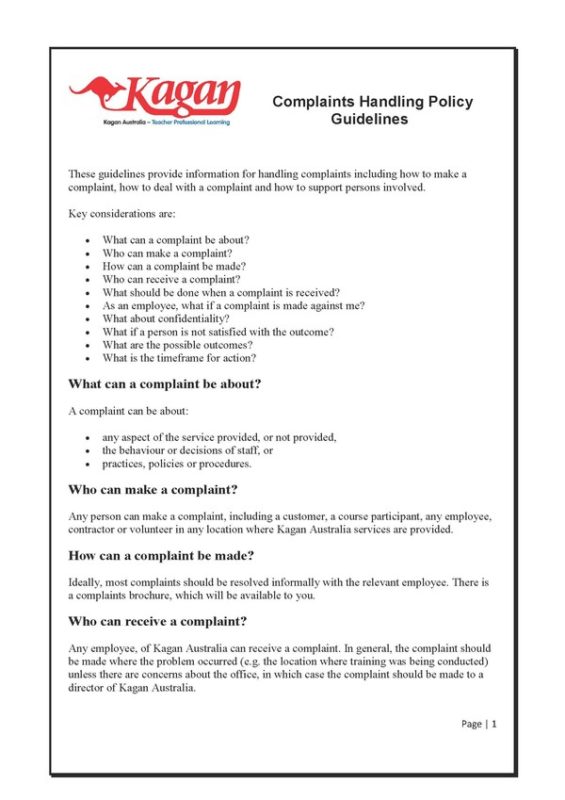Policy
Complaints Guidelines
Complaints Handling Policy Guidelines
These guidelines provide information for handling complaints including how to make a
complaint,how to deal with a complaint and how to support persons involved.Key considerations are:
- What can a complaint be about?
- Who can make a complaint?
- How can a complaint be made?
- Who can receive a complaint?
- What should be done when a complaint is received?
- As an employee, what if a complaint is made against me?
- What about confidentiality?
- What if a person is not satisfied with the outcome?
- What are the possible outcomes?
- What is the time frame for action?
What can a complaint be about?
- any aspect of the service provided, or not provided,
- the behaviour or decisions of staff, or
- practices, policies or procedures.
Who can make a complaint?
Any person can make a complaint, including a customer, a course participant, any employee, contractor or volunteer in any location where Kagan Australia services are provided.
How can a complaint be made?
Ideally,most complaints should be resolved informally with the relevant employee. There is a complaints brochure, which will be available to you.
Who can receive a complaint?
Any employee, of Kagan Australia can receive a complaint. In general, the complaint should be made where the problem occurred (e.g. the location where training was being conducted) unless there are concerns about the office, in which case the complaint should be made to a director of Kagan Australia.
What should be done when a complaint is received?
An employee who receives a complaint will need to determine, applying these guidelines, where there is a matter that can be resolved informally or whether it should be referred to a company director. Minor complaints should be resolved informally if possible and without delay. Any matter which cannot be resolved informally must be referred to a Director of Kagan Australia.
As an employee, what if a complaint is made against me?
If a complaint is made against you, then you will be given the opportunity to respond to the complaint.The complaint will be considered by your supervisor, or a company director. You will be given the opportunity to state your case, to seek advice, to have a support person presenting any meeting that might take place and you will be given the opportunity to respond to the complaint.
What about confidentiality?
All parties to a complaint are expected to treat the matter confidentially. This requires that all parties must ensure that information is restricted to those who genuinely need to know. Furthermore, those people should only be told as much as they need to know and no more. For example, some people may need to know of the issue so that they can provide advice, but not of the identities of the persons involved.
What if a person is not satisfied with the outcome?
It is possible that, at the end of the process, you will not receive the outcome that you wanted. If you feel that you have not been treated fairly or that the result is unreasonable, there are provisions for seeking a review, both internal and external. External bodies that may be able to assist include:
- NSW Ombudsman
- Anti-Discrimination Board of NSW (ADB)
- Human Rights and Equal Opportunity Commission (HREOC)
- Department of Fair Trading
What are the possible outcomes?
- Typical outcomes include:
- withdrawal of the complaint
- resolution of differences or agreement on a compromise
- apology given. (The use of apologies should be encouraged)
- use of the services of a professional mediator in achieving resolution.
- inability to resolve differences and subsequent decision by the director who may:
- if serious breaches are disclosed, take disciplinary/remedial action
- dismiss the complaint
- declare that resolution is not possible as the parties are unable to reach resolution
- uphold the complaint and implement the specific action to address the concerns
- determine that both parties are at fault and implement action to address the behaviour of both parties
Remedy
- Remedy may involve one or more of the following:
- providing explanation and reasons if not previously provided
- dismissing the complaint, e.g. if the decision accords with legislation or government policy or related workplace policy or procedure
- concluding that the complaint has been substantially resolved
- reaching a compromise solution
- upholding the complaint and implementing specific action such as overturning a decision, giving an apology, refunding any fees paid or providing a service not previously provided
- addressing or referring the issue for system improvement.
Systems improvement
Systems improvement may involve one or more of:
- policy development or revision
- process improvement (i.e. changes to procedures and workplace practices)
- program review
- expert assistance, staff development or performance improvement
- improved implementation (e.g. issuing updated documentation or reminders)
- monitoring compliance
- other action to ensure that the matter is handled appropriately in future.
What is the time frame for action?
Time frames are indicative to assist prompt action. Advise the complainant if a longer time frame is required.
- Immediate Remedy – Within 5 working days of receipt
- Director Remedy – Within15 working days of receipt by a Director

